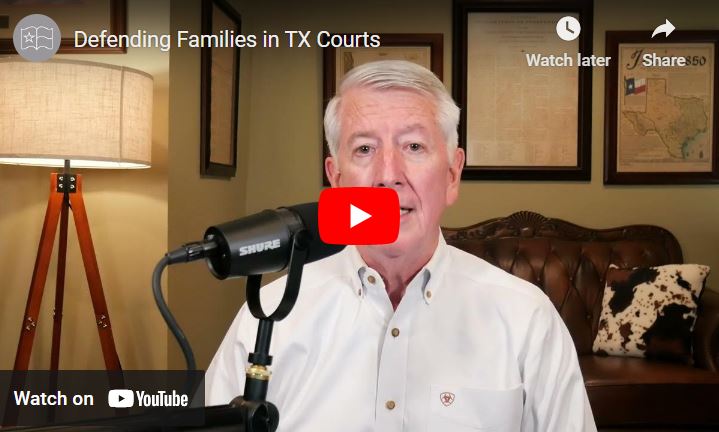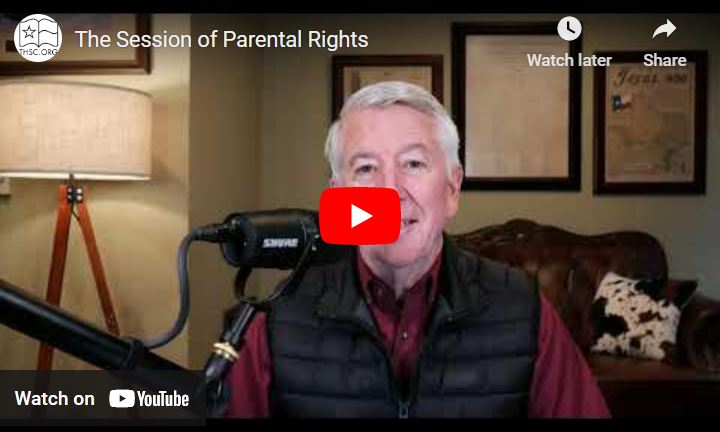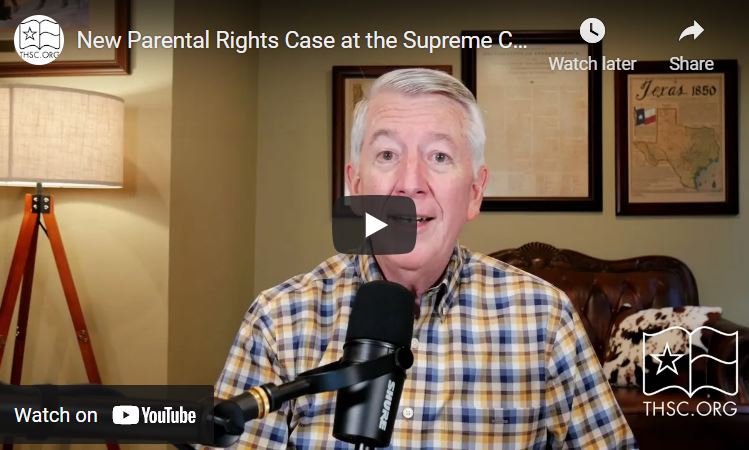In 2020, Texas families scored a major win when the Supreme Court of Texas (SCOTX) released a unanimous opinion upholding the right of parents to raise their children. The opinion was arguably the most significant parental rights victory in Texas history.
In 2021, it appears that the SCOTX may be revisiting the issue in a major way. When the court released its landmark opinion last June in the case known as In re C.J.C., the justices built their opinion around one central point.

According to the majority opinion, the cornerstone of the court’s legal analysis is that “[A] fit parent presumptively acts in the best interest of his or her child and has a ‘fundamental right to make decisions concerning the care, custody, and control’ of that child.”
In layman’s terms, the court’s opinion protects the proposition that parents know what is best for their children and that a court is not allowed to intervene simply because it disagrees. In legal terms, the court must “presume” that the decision of a fit parent regarding that parent’s child is the best decision.
However, Justice Debra Lerhmann noted that there was one very important question the court had not answered in it’s opinion: how do you know when a parent is unfit or when their decision is actually not in the child’s best interests?
In other words, the court had articulated a clear rule: You have to start by assuming that what the parent says goes. However, the court had not addressed under what circumstances a judge might be allowed to overrule a parent for making a clearly harmful decision.
Justice Lerhmann specifically noted that the court would likely have to address this question at some point. It appears that 2021 may be that point.
A case currently before the Texas Supreme Court raises these exact questions. In the Kalinec case, the question has arisen regarding what circumstances justify a court overruling the decisions of a parent.
The case involves a dispute between a father and his mother-in-law regarding custody of the father’s children. During a CPS case in which the father was found innocent by CPS, the children lived temporarily with the mother-in-law. When the CPS case ended, CPS returned the children to the father but, at the mother-in-law’s request, the court allowed her to have partial custody of the children.
The case was appealed and the appellate court ruled that the grant of custody to the mother-in-law was unconstitutional because the father was a fit father. The mother-in-law appealed the case to the Texas Supreme Court and now argues that because CPS temporarily removed the father’s children, he should be considered unfit at least to a degree, allowing her to maintain partial custody of the children.
Naturally, this raises the critical question of what makes a parent unfit? Notably, the Texas Supreme Court did not address that question in it’s 2020 opinion. If the court agrees to take up the case (which is likely since the court itself identified this question as an important one), it could have significant implications for Texas families.
Under the court’s 2020 opinion, fit parents have significant protection against unjust intervention by the state into their parenting decisions. However, in 2021, we are now tasked with answering the question, who is a fit parent?
THSC is watching the case closely and will consider intervening if necessary to protect the rights of Texas families.
Text “TXHOMESCHOOL” now to 919191 to receive legislative alerts!
In 2020, Texas families scored a major win when the Supreme Court of Texas (SCOTX) released a unanimous opinion upholding the right of parents to raise their children. The opinion was arguably the most significant parental rights victory in Texas history.
In 2021, it appears that the SCOTX may be revisiting the issue in a major way. When the court released its landmark opinion last June in the case known as In re C.J.C., the justices built their opinion around one central point.

According to the majority opinion, the cornerstone of the court’s legal analysis is that “[A] fit parent presumptively acts in the best interest of his or her child and has a ‘fundamental right to make decisions concerning the care, custody, and control’ of that child.”
In layman’s terms, the court’s opinion protects the proposition that parents know what is best for their children and that a court is not allowed to intervene simply because it disagrees. In legal terms, the court must “presume” that the decision of a fit parent regarding that parent’s child is the best decision.
However, Justice Debra Lerhmann noted that there was one very important question the court had not answered in it’s opinion: how do you know when a parent is unfit or when their decision is actually not in the child’s best interests?
In other words, the court had articulated a clear rule: You have to start by assuming that what the parent says goes. However, the court had not addressed under what circumstances a judge might be allowed to overrule a parent for making a clearly harmful decision.
Justice Lerhmann specifically noted that the court would likely have to address this question at some point. It appears that 2021 may be that point.
A case currently before the Texas Supreme Court raises these exact questions. In the Kalinec case, the question has arisen regarding what circumstances justify a court overruling the decisions of a parent.
The case involves a dispute between a father and his mother-in-law regarding custody of the father’s children. During a CPS case in which the father was found innocent by CPS, the children lived temporarily with the mother-in-law. When the CPS case ended, CPS returned the children to the father but, at the mother-in-law’s request, the court allowed her to have partial custody of the children.
The case was appealed and the appellate court ruled that the grant of custody to the mother-in-law was unconstitutional because the father was a fit father. The mother-in-law appealed the case to the Texas Supreme Court and now argues that because CPS temporarily removed the father’s children, he should be considered unfit at least to a degree, allowing her to maintain partial custody of the children.
Naturally, this raises the critical question of what makes a parent unfit? Notably, the Texas Supreme Court did not address that question in it’s 2020 opinion. If the court agrees to take up the case (which is likely since the court itself identified this question as an important one), it could have significant implications for Texas families.
Under the court’s 2020 opinion, fit parents have significant protection against unjust intervention by the state into their parenting decisions. However, in 2021, we are now tasked with answering the question, who is a fit parent?
THSC is watching the case closely and will consider intervening if necessary to protect the rights of Texas families.
Text “TXHOMESCHOOL” now to 919191 to receive legislative alerts!











